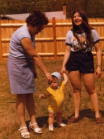Here is a great dementia resource for caregivers and healthcare professinals,
Your residents will love the Amazon Kindle Fire
Here is information on being the best caregiver you can be
Here is a way for nurses administrators, social workers and other health care professionals to get an easyceu or two
Follow alzheimersideas on twitter
The Dementia Caregiver's Little Book of Hope [Kindle Edition]
Barchester.com
Partaking in group mental activities to stimulate thought, conversation and memory improves the cognitive functioning of people with mild or moderate dementia, according to researchers.
A recent study claims that cognitive stimulation of patients through structured activities in a group setting one or more times a week for at least a month can improve the symptoms of dementia.
The sessions can include a discussion of current events, a show-and-tell, or drawing, among other activities.
According to Robert Winningham, professor at the University of Western Oregon, the study shows that patients in a care home facility could have better dementia outcomes if workers make use of interaction possibilities.
"This is showing the people who work in memory care communities and nursing homes and assisted living facilities that they can improve cognitive function, and they need to be providing these kinds of interventions," he told Reuters.
The study contributes to the growing body of research that suggests keeping the brain active can help combat dementia.
A recent study claims that cognitive stimulation of patients through structured activities in a group setting one or more times a week for at least a month can improve the symptoms of dementia.
The sessions can include a discussion of current events, a show-and-tell, or drawing, among other activities.
According to Robert Winningham, professor at the University of Western Oregon, the study shows that patients in a care home facility could have better dementia outcomes if workers make use of interaction possibilities.
"This is showing the people who work in memory care communities and nursing homes and assisted living facilities that they can improve cognitive function, and they need to be providing these kinds of interventions," he told Reuters.
The study contributes to the growing body of research that suggests keeping the brain active can help combat dementia.











